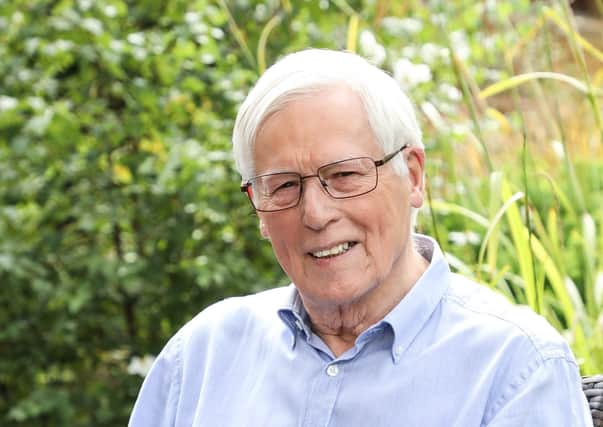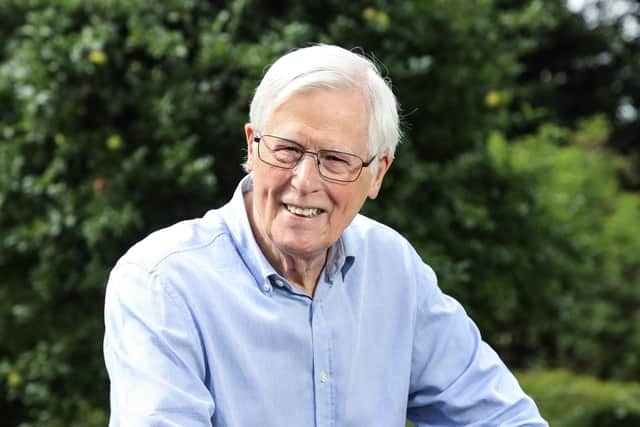‘Hearing nature again changed my world,’ says TV presenter John Craven


Nature and the outdoors has played a key role in John Craven’s life and career – from childhood bike rides in Yorkshire, to clocking up more than three decades as one of the presenters on BBC One’s Countryfile.
At a certain point however, hearing loss began to dampen his ability to fully soak up the sounds of wildlife and the great outdoors.
Advertisement
Hide AdAdvertisement
Hide Ad“It all started around 15 years ago, when I began to realise I was struggling to hear certain voices and sounds,” says Leeds-born Craven.


“I thought people were mumbling when they weren’t.‘Say again please’ became too common a response to family, friends and colleagues, and in crowded rooms it was hard to follow conversations.”
But probably even harder for the television presenter was when he started to lose connection with his beloved nature.
“Outdoors, I wasn’t hearing many of the gentler sounds of nature that everyone else was,” he recalls.
Advertisement
Hide AdAdvertisement
Hide Ad“All very frustrating. I used to kid myself I’d developed ‘selective hearing’, but the truth was I was becoming a little deaf.”


Eventually, he realised he had to confront the fact he needed help.
He went for a free hearing test at his local Specsavers, “and my world changed”.
Thankfully, hearing aids have turned everything around and, at 81, the countryside-loving grandfather and broadcaster is now encouraging others to also get their hearing checked.
Advertisement
Hide AdAdvertisement
Hide Ad“With hearing aids, sounds came back with a clarity I had forgotten – pages turning, clocks ticking, birds singing, and no one had to say everything twice to me,” he says.
“The family didn’t have to endure painfully high volume levels on TVs and radios, I no longer missed out on chatter, and it was now very much my own choice if I deployed ‘selective hearing’!”
He admits that there can be stigma around hearing aids, which can be a barrier for seeking tests and getting aids fitted.
“It’s true there is something of a stigma, but I’m not sure why this should be in this day and age, when many hearing aids are almost invisible,” says Craven.
Advertisement
Hide AdAdvertisement
Hide Ad“I suppose nobody likes to think they are losing any of their faculties, but the truth is that one in every six adults in the UK suffers some form of hearing loss – that’s 11 million of us – and two-thirds are over the age of 60.
“I remember wondering what the reaction would be when I started wearing spectacles on television, but there wasn’t any – viewers just took it for granted that I needed them.
“Hearing aids are generally less conspicuous – and really effective – so there’s no reason to be concerned about what others might think if you use them. My advice is that if you notice any change in your ability to hear, or indeed in that of someone close to you, get it tested. You have nothing to lose, and an awful lot to regain.”
He says the most frightening part was starting to lose the sounds of nature.
Advertisement
Hide AdAdvertisement
Hide Ad“I must admit, I was worried when I first began experiencing hearing loss because Countryfile is very much about the sounds, as well as the sights of nature. But hearing aids solved the problem and it is a real delight to experience the rustle of leaves, the pitter-patter of raindrops, the distant roar of thunder as easily as anyone with normal hearing.
“As someone once said: ‘Sound is the vocabulary of nature.’
“Our gardens can also be a fantastic listening zone, giving us everything from the buzzing of bumble bees and the cooing of pigeons to, in my case, beautifully tuned wind chimes sent by friends in California.
“The other day, I was weeding when I heard a screech and, alerted by the noise, looked up and saw a red kite circling low. That sight and sound gave me an extra thrill because on Countryfile, I played a very small part in re-introducing this spectacular bird species into the UK, 30 or so years ago, after it had been persecuted to extinction. Now, red kites are thriving – and even pay me a visit.
“My garden is mostly free of traffic noise and one of the great pleasures in life is to relax there in the late evening sunshine after a busy day, eyes closed and ears fully working, listening in peace and quiet to blackbirds, thrushes, woodpeckers and whatever other wildlife happens to come by.”
Advertisement
Hide AdAdvertisement
Hide AdCraven says his joy of nature started from a very early age growing up in Yorkshire.
“I’m extremely fortunate to have a job which has taken me into the great outdoors almost every week for the past three decades,” he explains.
“I was brought up on the outskirts of Leeds (Grimethorpe Street) and given a bike for passing the 11-plus. Soon, I was peddling out to Lower Wharfedale with my pals and spent many happy hours discovering nature.”
He describes the Lower Wharfedale area and the Otley Chevin as “one of my favourite places in the world”.
Advertisement
Hide AdAdvertisement
Hide Ad“The passion I developed then for our countryside, which I consider to be the finest in the world, has stayed with me ever since.”
He attended the same Leeds school as Alan Bennett. He left school at 16 for a commercial apprenticeship at Yorkshire Copperworks in Stourton, and though it wasn’t a great fit he started writing for the company magazine and interviewed the likes of Benny Hill and Cliff Richard who were appearing in Leeds, and his passion was fired.
His first proper job as a journalist was at the Harrogate Advertiser where he was a cub reporter. A move to The Yorkshire Post followed and he worked with the likes of Jean Rook, who was women’s editor, Bernard Ingham and the “fearsome” deputy editor and theatre critic Desmond Pratt
He moved into television presenting, firstly at BBC Newcastle, and in 1970 the local news programme Points West in Bristol. He then presented a children’s talk show called Search. Two years later, beginning with a six-week trial run, Newsround was born and he was to front it for 17 years.
Advertisement
Hide AdAdvertisement
Hide AdIn 1989, after 3,000 episodes, just days after announcing his departure from Newsround, he made the move away from children’s TV and began to present Countryfile
Like a lot of people he has found solace in nature during the pandemic, walking, when able, around his now home in Oxfordshire.
“During the early days, when we all felt trapped both physically and mentally, we realised how much we missed being outdoors,” he recalls.
“When some restrictions were eased, and we could go to parks or the nearest countryside, I walked with sprightly steps along my favourite paths around my village, getting much-needed exercise and feeling free.
“Since then, what a tonic it has been to venture into wide-open places once again and just stand and stare and listen as nature surrounds us.”
For more information, visit specsavers.co.uk
Comment Guidelines
National World encourages reader discussion on our stories. User feedback, insights and back-and-forth exchanges add a rich layer of context to reporting. Please review our Community Guidelines before commenting.